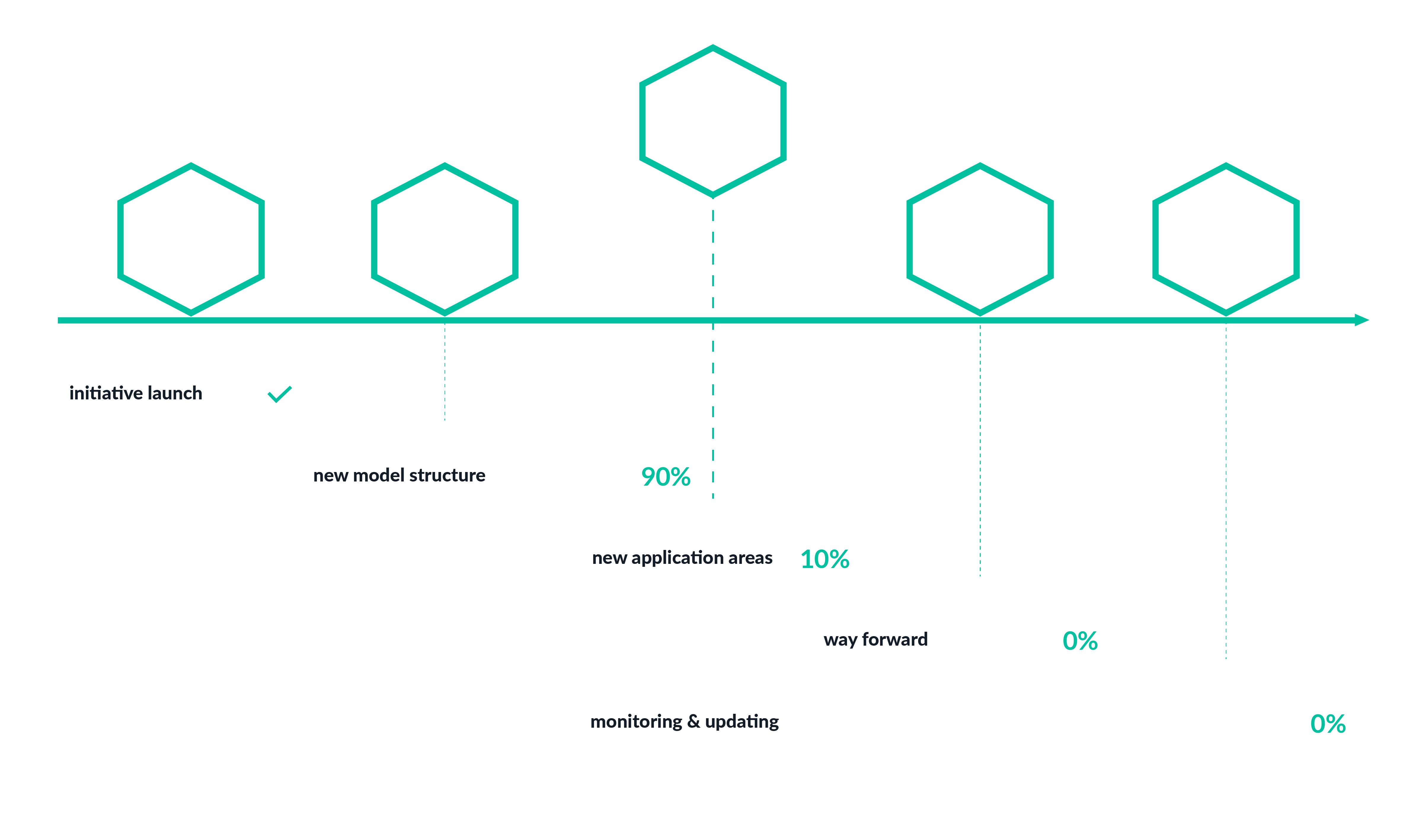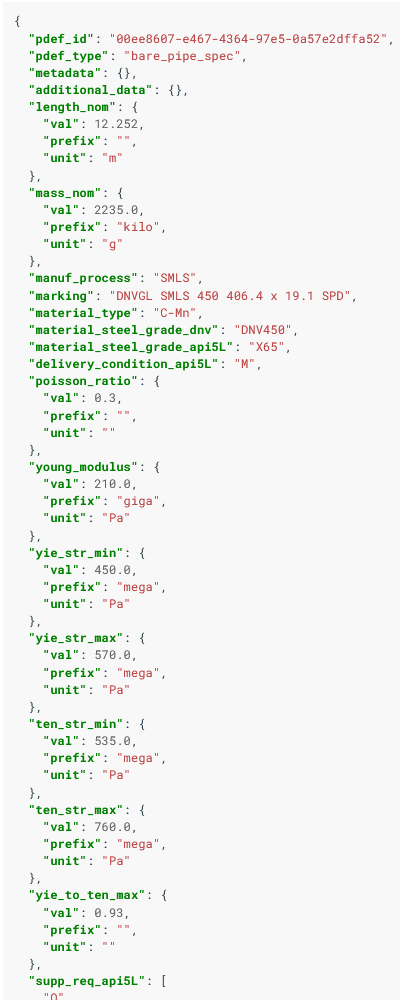What does the PDEF project do?
Description & Objective :
-
Agree on an industry-wide common format to describe all data that defines and is used in design and operations management of subsea pipelines, to facilitate efficient data exchange between different parties involved in any given project.
-
Produce documentation describing the data format and a web interface allowing to populate and access a set of data → The creation of a common data format is expected to result in development of a range of new tools and services to improve the overall design process.
Scope :
-
How the data format is structured to allow integration of new features in the future, e.g. riser system, or other disciplines.
-
How to integrate the data needs of different sub-disciplines.
-
How the format can deal with different types of pipelines such as single pipe, PIP, piggybacks, bundles, etc.
-
How the pipeline is discretised and what is the overall architecture of the data and the interrelation between data subsets. The dataset will be multi-disciplinary, including aspects such as operating, linepipe, routing, metocean, geotechnical, fabrication and installation data.
-
Format organisation to allow different levels of detail on the data, depending on the phase of the project and life of the pipeline.
-
How the source/reference of each data point is recorded and tracked through the life of a project/pipeline.


TRL (as per API scale) :
-
Currently: TRL 0 (The need has been identified with sponsors and has been initiated with the knowledges Dynamès has of the current data formrat for some actors of oil extraction offshore)
-
Expected at the end of the CITEPH project: TRL 5 (Solution will be tested and ready to be released in production for sponsors, evolutions could be started)
Opportunity Value for the Sponsor Companies :
-
Simplify and accelerate the process of data exchange processes.
-
Prevent unnecessary errors when copying data from reports.
-
Allow the engineers to perform added value activities using the easily accessible data.
-
Provide a clear and efficient format in which all the data of a pipeline can be stored, in a form that can be easily accessed years after the project has been completed.
-
Put in place the first block required to incorporate all the power of digitalisation into subsea pipeline engineering. This will make possible a certain automatization of the design process, allowing to update easily a design when some input data is modified. Eventually it will enable different forms of design optimisation and data analytics.
-
Improve designs and reduce project delays and costs.

Example of PDEF documentation with the Bare Pipe specification
pdef.model.bare_pipe_spec.BarePipeSpec-
BarePipeSpec stores data intended to gather the specified properties of BarePipe objects.
- Config
-
-
extra: str = forbid
-
delivery_condition_api5L: Optional[Literal[R, N, Q, M]]-
Delivery condition for the pipe.
- Constraints and examples:
-
-
example = [‘M’, ‘Q’]
-
length_nom: Optional[pdef.model.measure.Length]-
The specified linepipe Length.
- Constraints and examples:
-
-
example = {‘val’: 12.252, ‘unit’: ‘m’}
-
manuf_process: Optional[Literal[EBW, LBW, HFI, MWPHFW, SAW, SAWL, SAWH, SMLS]]-
Process of manufacturing used to make the pipe.
- Constraints and examples:
-
-
example = SMLS
-
marking: Optional[str]-
Marking for the pipe.
- Constraints and examples:
-
-
maxLength = 256
-
example = [‘DNVGL SMLS 450 SP 323.9 x 14.3’, ‘DNVGL MWPL 415 D L – UNS S31600 (B) UNS N06625 (E)’, ‘X API Spec 5L 508 12,7 L360M PSL 2 SAWL Y Z TESTED 17,5’]
-
mass_nom: Optional[pdef.model.measure.Mass]-
Bare pipe nominal Mass, empty in air.
- Constraints and examples:
-
-
example = {‘val’: 398.7, ‘prefix’: ‘kilo’, ‘unit’: ‘g’}
-
material_steel_grade_api5L: Optional[Literal[X42, X52, X56, X46, X60, X65, X70, X80]]-
Main steel material grade, as per API5L acronym.
- Constraints and examples:
-
-
example = [‘X65’]
-

-
-
-
material_steel_grade_dnv: Optional[Literal[DNV245, DNV290, DNV320, DNV360, DNV390, DNV415, DNV450, DNV485, DNV555]]
-
-
Main steel material grade, as per DNV acronym.
- Constraints and examples:
-
-
example = [‘DNV450’]
-
material_type: Optional[Literal[C-Mn, CRA, LINED/CLAD]]-
Material type used to make the pipe.
- Constraints and examples:
-
-
example = [‘C-Mn’, ‘LINED/CLAD’, ‘CRA’]
-
mill_test_pressure: Optional[pdef.model.measure.Pressure]-
Pressure at which the pipe is to be hydrotested at the mill.
- Constraints and examples:
-
-
example = {‘val’: 405, ‘unit’: ‘bar’}
-
oor_tol_body: Optional[pdef.model.measure.Length]-
Out-of-roundness tolerance of the linepipe body (steel external surface), specified.
- Constraints and examples:
-
-
example = {‘val’: 6.1, ‘prefix’: ‘milli’, ‘unit’: ‘m’}
-
oor_tol_end: Optional[pdef.model.measure.Length]-
Out-of-roundness tolerance of the linepipe end (steel external surface), specified.
- Constraints and examples:
-
-
example = {‘val’: 4.06, ‘prefix’: ‘milli’, ‘unit’: ‘m’}
-
out_dia_nom: Optional[pdef.model.measure.Length]-
Outside diameter of the linepipe (steel external surface), nominal, specified.
- Constraints and examples:
-
-
example = {‘val’: 323.9, ‘prefix’: ‘milli’, ‘unit’: ‘m’}
-
out_dia_tol_neg_body: Optional[pdef.model.measure.Length]-
Outside diameter negative tolerance of the linepipe body (steel external surface), specified.
- Constraints and examples:
-
-
example = {‘val’: -3.05, ‘prefix’: ‘milli’, ‘unit’: ‘m’}
-
out_dia_tol_neg_end: Optional[pdef.model.measure.Length]-
Outside diameter negative tolerance of the linepipe end (steel external surface), specified.
- Constraints and examples:
-
-
example = {‘val’: -2.03, ‘prefix’: ‘milli’, ‘unit’: ‘m’}
-
out_dia_tol_pos_body: Optional[pdef.model.measure.Length]-
Outside diameter positive tolerance of the linepipe body (steel external surface), specified.
- Constraints and examples:
-
-
example = {‘val’: 3.05, ‘prefix’: ‘milli’, ‘unit’: ‘m’}
-
out_dia_tol_pos_end: Optional[pdef.model.measure.Length]-
Outside diameter positive tolerance of the linepipe end (steel external surface), specified.
- Constraints and examples:
-
-
example = {‘val’: 2.03, ‘prefix’: ‘milli’, ‘unit’: ‘m’}
-
pdef_type: str = ‘bare_pipe_spec’-
- Constraints and examples:
-
-
const = bare_pipe_spec
-
poisson_ratio: Optional[pdef.model.measure.UnitLess]- Characteristic steel Poisson UnitLess ratio.
-
- Constraints and examples:
-
-
example = {‘val’: 0.3, ‘unit’: ‘’}
-
supp_req_api5L: Optional[List[Literal[S, O, N]]]-
Supplementary requirements from the purchaser, as per API5L.
- Constraints and examples:
-
-
example = [“[‘O’, ‘S’]”, “[‘O’]”]
-
supp_req_dnv: Optional[List[Literal[D, F, P, S, U]]]-
Supplementary requirements from the purchaser, as per DNV.
- Constraints and examples:
-
-
example = [“[‘S’, ‘P’]”, “[‘U’]”]
-
ten_str_max: Optional[pdef.model.measure.Pressure]-
Pressure for Tensile Strength Maximum, specified.
- Constraints and examples:
-
-
example = {‘val’: 570, ‘prefix’: ‘mega’, ‘unit’: ‘Pa’}
-
ten_str_min: Optional[pdef.model.measure.Pressure]-
Pressure for Specified Minimum Tensile Strength (SMTS).
- Constraints and examples:
-
-
example = {‘val’: 760, ‘prefix’: ‘mega’, ‘unit’: ‘Pa’}
-
wth_nom: Optional[pdef.model.measure.Length]-
Wall thickness of the linepipe (internal to external bare steel surface, excluding liner, clad, coating, etc), nominal, specified.
- Constraints and examples:
-
-
example = {‘val’: 14.3, ‘prefix’: ‘milli’, ‘unit’: ‘m’}
-
wth_tol_neg: Optional[pdef.model.measure.Length]-
Wall thickness tolerance of the linepipe (internal to external bare steel surface, excluding liner, clad, coating, etc), negative, specified.
- Constraints and examples:
-
-
example = {‘val’: -1.43, ‘prefix’: ‘milli’, ‘unit’: ‘m’}
-
wth_tol_pos: Optional[pdef.model.measure.Length]-
Wall thickness tolerance of the linepipe (internal to external bare steel surface, excluding liner, clad, coating, etc), positive, specified
- Constraints and examples:
-
-
example = {‘val’: 1.78, ‘prefix’: ‘milli’, ‘unit’: ‘m’}
-
yie_str_max: Optional[pdef.model.measure.Pressure]-
Pressure for specified Yield Strength Maximum.
- Constraints and examples:
-
-
example = {‘val’: 535, ‘prefix’: ‘mega’, ‘unit’: ‘Pa’}
-
yie_str_min: Optional[pdef.model.measure.Pressure]-
Pressure for Specified Minimum Yield Strength (SMYS).
- Constraints and examples:
-
-
example = {‘val’: 450, ‘prefix’: ‘mega’, ‘unit’: ‘Pa’}
-
yie_to_ten_max: Optional[pdef.model.measure.UnitLess]-
Specified Maximum Yield to tensile UnitLess ratio, (Strain Hardening).
- Constraints and examples:
-
-
example = [{‘val’: 0.93, ‘unit’: ‘’}, {‘val’: 93, ‘unit’: ‘%’}]
-
young_modulus: Optional[pdef.model.measure.Pressure]-
Pressure for characteristic steel Young’s modulus.
- Constraints and examples:
-
-
example = {‘val’: 210, ‘prefix’: ‘giga’, ‘unit’: ‘Pa’}
-
-
Keys words :
Offshore & Subsea / Digital Transformation / Safety, Computer Security & Reliability
Project leader :
Dynames I.T.
Estimated cost & duration :
→ Total Budget: 300 k€ / Year
36 rue de l'Ancienne Mairie
92100 BOULOGNE-BILLANCOURT
+ 33 1 40 92 77 66
Contact us